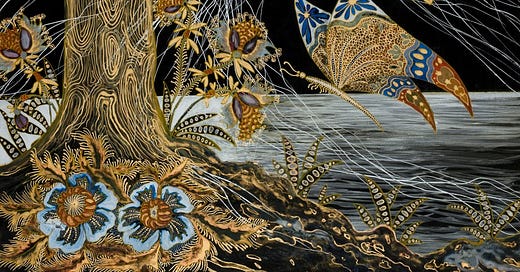How to escape surveillance
On walking across borders in Poland, playing banned music in Indonesia, and dancing the Palestinian dabke in New Jersey
Last week in Indonesia, police arrested 75 people for attending what the state called a “gay party.” Donald Trump described the anti-ICE protests in Los Angeles as an “insurrection.” The UN warned that the children in Gaza will soon begin dying of thirst. And the right to seek asylum remained suspended on the Polish-Belarusian border, where police physically shove people hoping to enter Europe back through a series of “pushback” gates.
How do we cope? In New Jersey, a survivor of the genocide in Gaza finds comfort in the rhythms of traditional arts at the Palestinian American Community Center. Rachmi Diyah Larasati blasts banned punk music over the drone of police motorcycles in Jakarta. Benjamin Andrew Schupmann looks to Thucydides to better understand the danger of Trump’s rhetoric. And Inga Hajdarowicz walks in the primeval Białowieża Forest and discovers that the lost objects along the trail tell their own story.
What’s Lost Along the Polish-Belarusian border
Inga Hajdarowicz
It is unlikely that a casual walker will encounter people on the move during a stroll in the Białowieża woods. Asylum seekers usually traverse dense forests and swamps, funneled into this hostile terrain by the state’s strategic placement of security sites along easier routes and closing official ways of entering the country and applying for asylum. At the same time, the old forest offers protection from uniform services and drones, as well as hideouts for resting along the way. But occasionally, these concealed routes run parallel to official tourist trails, with the sounds of chatting and laughter of the one group of walkers reaching the ones in hiding. Though physically close, the social categories of the walkers are far apart—a distance determined by the legacies of colonialism and racialization.
Trump, Thucydides, and the Corruption of Language
Benjamin Andrew Schupmann
The ancient Greek historian Thucydides was one of the first to realize the relationship between social disintegration and distorted language.
Writing about the Peloponnesian War, he recounts the civil strife that engulfed the city-state of Corcyra. What began as a policy disagreement between democrats and oligarchs devolved into a massacre: Sacred norms were abandoned, temples desecrated, and families torn apart by violence and suspicion.
The Pulse of Palestinian Identity in New Jersey
Anonymous
As a genocide survivor who had relocated to New York from an open-air prison in Gaza in August 2024, I wondered what it would mean to be a Palestinian from the perspective of Palestinian Americans.
Was there a space in America that kept them connected with their Palestinian identity? Where was it? How were they supporting the homeland? What challenges faced them during the ongoing genocide?
The Politics of Music and Motorcycles in Indonesia
Rachmi Diyah Larasati
One summer morning last year in Yogyakarta, Java, I heard the distinct sound of motorcycles approaching my yard. My body registered immediate discomfort and fear at the sound. On my street, two Yamaha RX-King motorcycles came and went several times before finally parking in my yard without their riders, who wore military uniforms, greeting me or asking permission. A group of villagers arrived and gathered in my gazebo, with several farmers watching nearby. Their quiet presence signaled that they were immediately alert, just as I was, to the distinctive buzz of the state.







